Leadership-in-Action Reflection Blog: A Comedy-Based Psychosocial Intervention for Teenagers Experiencing Adversity

Teen from the centre: “Uncle Alois [SOS Staff]—the kids at my school made fun of me when I was leaving to come here. They think it’s embarrassing.”
Alois: “They are just jealous—look at what you have around you: extracurricular activities, sports fields, food, housing, water, friends….many guests as well coming from all over the world to see you….they are just jealous…they wish they could come here. Don’t listen to them…Don’t give up…there’s always a way out”
This was my absolute very first time seeing my staff contact, Alois Aloo, interact with a teenager on site during my first day at SOS Children’s Villages in Cape Town, which houses orphaned, abandoned, and precariously housed children. I had the pleasure of running a comedy-based psychosocial intervention for teenagers (among other things!), but little did I know, the moment that I witnessed above was an omen of one of my biggest lessons during my 6-week Leadership-in-Action (LiA) project: whatever problem you have, there is always a way out—never give up.
There’s no Time
In my 6 weeks at SOS Cape Town, I witnessed more creative problem-solving from the staff and children there than I had in all of my lifetime. The absolute grace that the centre’s director, Zama Mbele, had in handling many, many challenging situations was absolutely stunning. I recall a meeting that we had there around the second week of my stay. I had felt settled down and so I had asked her if she could share more details regarding the general reasons why a child might be admitted at SOS (e.g., is it more due to being orphaned, or abandoned, etc.). I ended up learning about some of the typical scenarios a child ends up at the centre, and I remember nodding and actively listening, but inside, I was in complete shock and terror. Immediately after our meeting, I excused myself, went to the nearest washroom, and cried profusely while dry heaving due to the information that I became aware of. “How could humans do this to each other?”, I remember thinking to myself, mid-existential crisis. But then, I remembered Zama telling me about how desperately overburdened the South African child welfare system was and that, if organizations like SOS did not step up, then these children would have nowhere else to go. Similar to Alois reassuring that teenager about the importance of gratitude in overcome hardship, Zama seemed to exuberate an aura that demanded we (i.e., everyone working at the centre) did not have time to ponder the philosophical realms of good and evil in human nature—we needed to serve and protect these children from additional hardship by fully being present for them.
I realized this semi-self-indulgent tendency to overanalyze trauma within me might have been due to my Western upbringing; nonetheless, I quickly learned the importance of 1) being present while running my comedy-based intervention, 2) conserving my energy by not unnecessarily questioning deep theoretical meanings of life, and 3) taking everything one day at a time, one child at a time. By using Alois and Zama as role models, I was able to, in turn, become present for the children under my care. Now, thanks to my ability to remain present during my 6-week stay, I am about to start a virtual mentorship program with some of the teenagers due to the number of questions that I would often get from them about life, such as “how do you know when you’re in love”. As such, I did not let my mind wander and drain me, which would have prevented my ability to engage on such a personal level with the teenagers under my care.
Let’s (actually) get to the Root of it
However, on a grander scale, I realized that there is a systemic issue with how most of the world approaches children who cannot live with their biological family anymore. Even in the radio interview that I was grateful to do about my work at SOS, I got asked about how I am “able to connect with such brutalized children”. I feel this speaks to a larger view on how most individuals view children who have not grown up with their biological family; there is a sort of trepidation and uncertainty. However, the problem is with the system, not with the children – there needs to be properly funded alternative care in place for family systems that disintegrate. We need to stop living in this dysfunctional utopian world where we pretend to all be in loving homes. Undoubtedly, many do live in genuinely loving homes, but to the ones that pretend to be, we need to be honest on how this contributes to stigma for children like at SOS Cape Town. We need to stop pretending that it’s only a small minority of children who experience this type of hardship, because the stats don’t show this, especially adult-reported questionnaires about past childhood trauma. Frankly, we get forced to pretend like everything is fine and it literally kills children by contributing to stigma towards those who aren't in a position to hide their family situation.
A Renewed Connection
In short, South Africa forced me to become my most authentic self. I saw first-hand the dangers of when we put on airs. I am now more direct with my relationships regarding how I feel and what I need; and I expect that from people around me as well. I simply do not have time to live in a double-reality where we pretend to be something we are not. Since I’ve come back, I have been told by close others that I seem different and more confident. As a whole, I believe this is because South Africa forced me to get back in touch with strengths that I forgot about from my younger self. Lastly, Alois had reminded that teen on my first day to not give up and that there is always a way out...when I returned to Canada, I realized why it sounded so familiar…
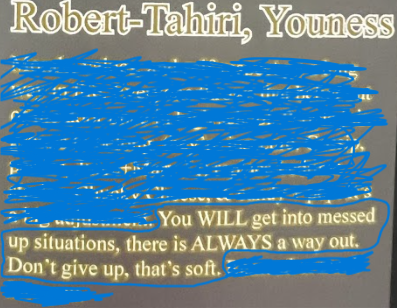
Acknowledgements
I am deeply indebted to the Laidlaw Foundation for trusting me with my ambitious ideas and funding my journey throughout; thank you Susanna Kempe for suggesting that I reach out to SOS. I am also grateful for the University of Toronto Laidlaw Scholars Program in particular for taking care of many details in preparation for this 6-week adventure—your enthusiastic encouragement was so appreciated. I also want to thank Sipelile Kaseke from SOS who responded to my cold email with kindness and curiosity—my project would have never happened if you did not open that email. Thank you as well to Zama Mbele from SOS—you are such a strong, powerful, passionate person who truly cares about children’s well-being; I learned so, so, so much from you. I also need to thank my right-hand man, Alois Aloo, who is the youth coordinator from SOS, who not only came to every single improv class, but ended up performing (and crushing it!) in our final comedy show; you modelled such positive outlooks on my project and set me up for success with the teenagers—it was an honour to work with you, you will always have a brother in Canada now (It was also incredible that we found common ground even though I’m an Arsenal supporter and you’re a Manchester City fan!). Finally, and most importantly, I want to thank all the teenagers who participated in this intervention and constantly made me fall to my knees while uncontrollably laughing—ek is lief vir jou!
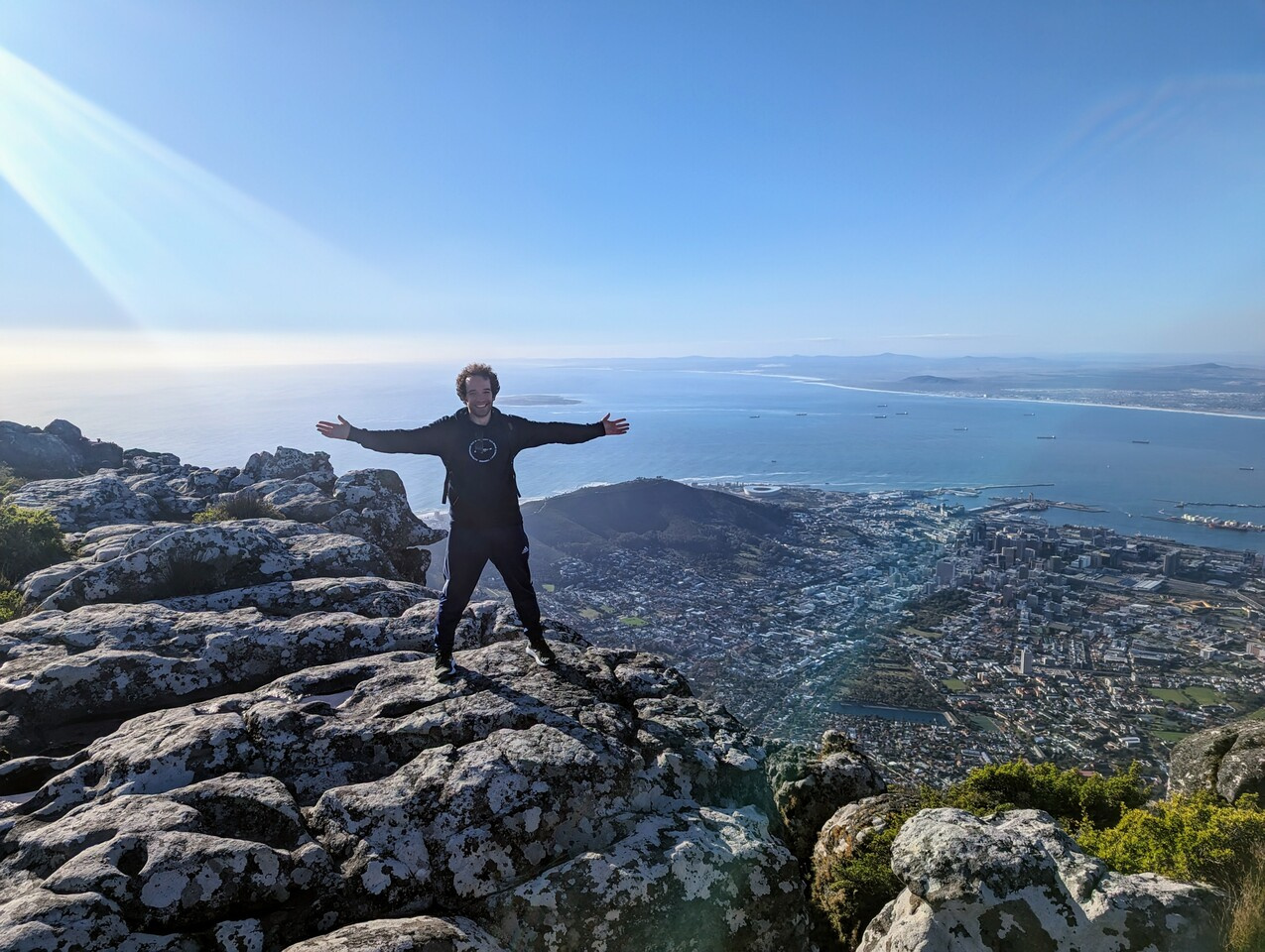

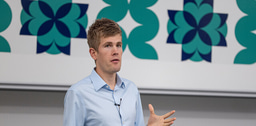
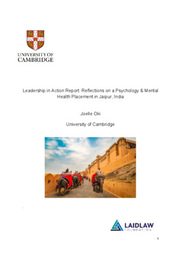
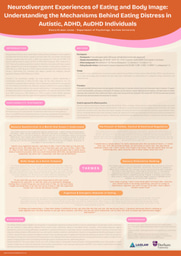
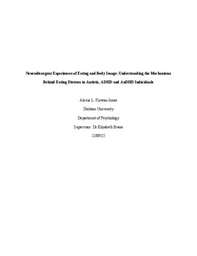
Please sign in
If you are a registered user on Laidlaw Scholars Network, please sign in